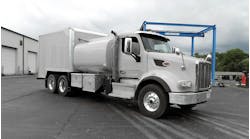The U.S. Department of Labor recently published a final rule that’s intended to help employers and workers better understand the employee vs. independent-contractor qualifications under the Fair Labor Standards Act—and the trucking industry’s largest trade association vows to work with Congress to defeat the “ill-advised” rule.
“I can think of nothing more un-American than for the government to extinguish the freedom of individuals to choose work arrangements that suit their needs and fulfill their ambitions,” Chris Spear, ATA president and CEO, said in a news release. “More than 350,000 truckers choose to work as independent contractors because of the economic opportunity it creates and the flexibility it provides, enabling them to run their own business and choose their own hours and routes. That freedom of choice has been an enormous source of empowerment for women, minorities, and immigrants pursuing the American Dream.”
ATA is among many transportation stakeholders expressing dissatisfaction with the government’s intervention on the issue. The rule, which takes effect March 11, rescinds the Trump administration’s Jan. 7, 2021, Independent Contractor Rule the department contends is not consistent with “the law and longstanding judicial precedent.”
The Justice Department calls misclassification “a serious problem” that impacts workers’ rights to minimum wage and overtime pay, facilitates “wage theft,” allows some employers to “undercut their law-abiding competition,” and hurts the economy at-large.
“Misclassifying employees as independent contractors is a serious issue that deprives workers of basic rights and protections,” Julie Su, acting secretary of labor, said in a statement. “This rule will help protect workers, especially those facing the greatest risk of exploitation, by making sure they are classified properly and that they receive the wages they’ve earned.”
Read more at FleetOwner.com, a Bulk Transporter affiliate.









